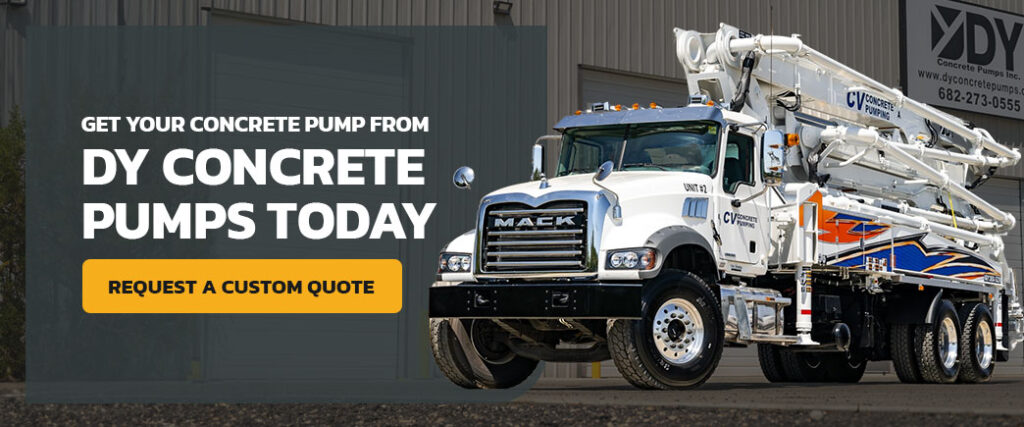Concrete Pump ROI and Cost Efficiency
Posted On: 02/02/2024 | Posted by: DY Concrete Pumps
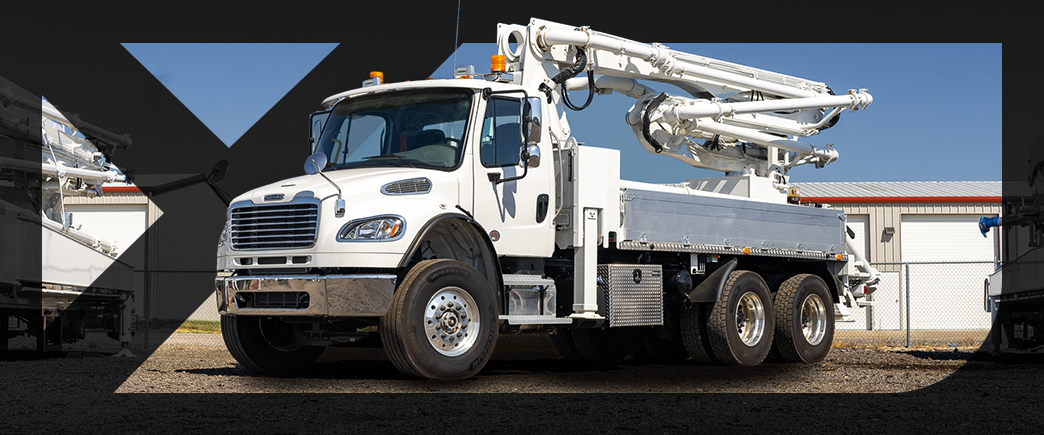
A concrete pump is an invaluable asset for a construction company. However, you must know how to make money with a concrete pump to justify investing in one. This guide will teach you how to calculate a concrete pump’s return on investment to learn how it will pay off in the long run.
Understanding the ROI of Concrete Pumps for Construction Companies
You must know how to calculate ROI to ensure today’s investments will pay off in the long run. But first, let’s explain how ROI applies to the construction industry.
The Concept of ROI in Construction
ROI is a term that describes an investment’s profitability compared to its cost. You can calculate it by dividing a project’s net profit by its total expense. The result is a percentage. A positive ROI means your investment will be profitable. For example, if you invest $100,000 and earn $120,000 in net profit, your ROI is 20%, making it worth the investment.
Cost efficiency is another crucial aspect of ROI. This concept refers to the ability to deliver projects and output at the lowest price possible without sacrificing quality. Your investment must influence your cost efficiency while still resulting in a positive ROI.
ROI affects the following business considerations.
- Resource allocation: ROI analysis makes it easier for businesses to allocate resources effectively. You can allot appropriate resources, labor, material and equipment by focusing on the highest-ROI projects. You can also judge whether it is worth investing in new equipment to improve your profit margins.
- Risk assessment: By calculating ROI, construction companies can better assess risks associated with each project. Factor in project duration, material expenses and labor costs to decide how much to budget for each project and the risks attached.
- Decision-making: Use your ROI calculations to make strategic decisions that move your company forward. You can determine each project’s earnings using the hard numbers.
What Is the ROI of Concrete Pumps?
As more opportunities come your way, equip yourself to complete projects on time and optimize cost efficiency. When buying a concrete pump, you must know what to look for and what best suits your needs. However, you also need to consider how it will impact your ROI. Account for a concrete pump’s cost versus its revenue-earning ability.
Calculating the ROI of new construction hardware requires a slightly different approach than project ROI. You typically buy equipment to expand your arsenal of tools and provide more services. Companies that own concrete pumps can tackle more lucrative projects, completing them quickly and safely. However, you must weigh various factors to determine whether the purchase is worthwhile.
- ROI: The ROI for concrete pumps refers to the time it takes to recover from the upfront expense, based on its uses and future contributions to your projects.
- Payback period: Your concrete pump’s PBP is the point when the equipment has paid for itself. The pump’s efficiency and usefulness are vital attributes in determining its PBP.
- Residual value: The concrete pump’s residual value is the amount of money you can earn by selling it when it’s time for an upgrade. The quality and model you purchase can influence the residual value and the wear and tear caused to your pump over the years.
What is the ROI on a concrete pump, and how do you calculate it? As mentioned earlier, ROI is a percentage determined by dividing the net income your pump generates by its initial cost. Jobs you might previously have been ineligible to bid on before owning the pump can help you find this figure.
Your concrete pump’s payback period closely relates to its ROI. Calculate your PBP by dividing your investment cost by your annual cash flow. The result is the number of years it will take for the machine to pay itself off.
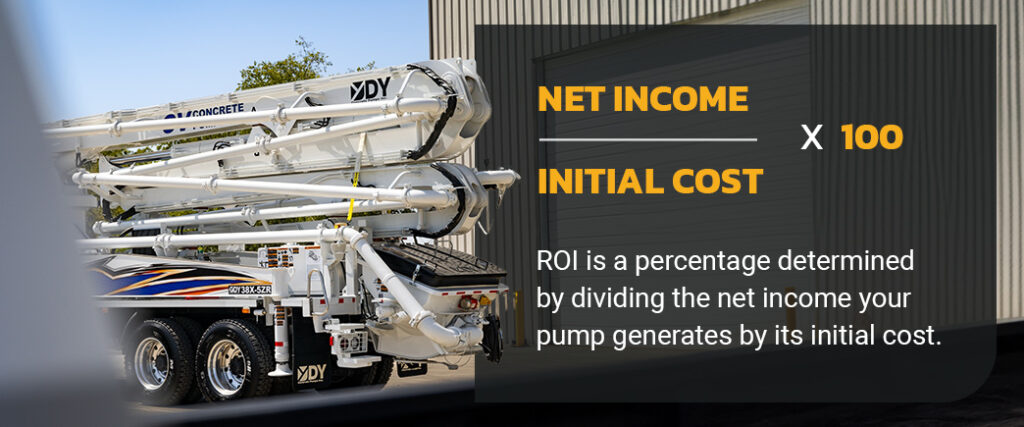
Investing in Concrete Pumps — A Cost-Benefit Analysis for Developers
A concrete pump is an essential part of making money in the concrete business. It will open new revenue streams for your construction company and make you more competitive in your local market. Before investing in a concrete pump, you must understand how it will affect you now and later.
Initial Costs and Potential Returns
Your concrete pump’s initial costs include purchasing, assembly and installation. The type, size and quality of your chosen pump influence price. Often, a higher initial cost leads to more opportunities that will pay it off faster.
Models like boom pumps and line pumps have different features, uses and price points. Compare your options and make the best choice based on your workload and goals.
Factors you may not have considered can affect the potential returns your concrete pump brings.
- Reliability: Your pump’s durability and reliability determine what conditions you can use it in. Can your pump work immediately in an emergency? What about inclement weather? You must consider these questions when choosing the pump you want to buy.
- Required training: Your operators need to learn how to use your concrete pump. This required training is an additional expense.
- Usability: You can significantly improve your overall efficiency with concrete pumps.
- Parts availability: Getting the parts you need to make repairs and keep your equipment operational will affect its value in the long run.
- Resale: The pump’s resale value will affect its PBP and determine if the initial cost is worth the investment.
Long-Term Advantages and Savings
These are some of the many functions and cost-saving benefits that come with adding a concrete pump to your fleet.
- Efficiency: You can speed up project timelines with a concrete pump, leading to a noticeable increase in productivity.
- Time-saving: A concrete pump is invaluable for projects with tight deadlines. You can adjust work schedules and meet deadlines sooner by using your concrete pump effectively.
- Reduced wastage: Manually transporting concrete leads to spills and wastage. A concrete pump can pump everything without risk of spillage and uses all the material you put into it, saving you money on materials.
- Improved results: A concrete pump allows the concrete to run consistently. The consistency this creates will minimize the risks of defects like weak spots and air pockets and reduce any potential risks to structural integrity.
- Versatility: Concrete pumps’ reach and versatility make them suitable for various construction projects. A concrete pump is an essential tool every concrete contractor should own. They are easy to transport and set up, and they can even access hard-to-reach places like high-rises and confined spaces.
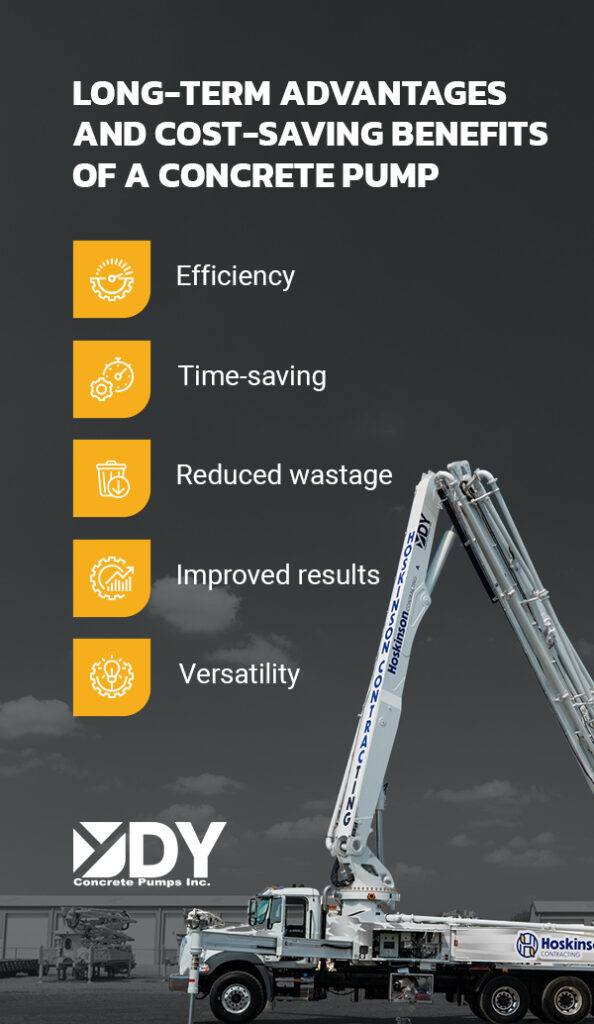
The Impact of Concrete Pumps on Project Timelines and Budgets
Buying a concrete pump will shorten project timelines and make you a more dependable contractor. If you choose to buy one, you must consider the additional budgetary implications of owning it.
Efficiency and Benefits of Owning a Concrete Pump
When crunching the numbers, remember these functional benefits a concrete pump will bring to your company.
- Move concrete effectively: Debris and other obstacles can make it challenging to manually move concrete through a work site. A pump truck’s hose lets you quickly distribute concrete.
- Easily fill forms: Filling large or tall forms by hand can take a lot of time and be quite a challenge, depending on their shape and height. Using a concrete pump will make it easy to fill these forms effectively.
- Keep trucks at a distance: Moving through tough terrain, heavy mud or small areas can cause accidents and damage to your vehicle. You can set up your concrete pump from convenient points and bypass the need to traverse through difficult areas while getting the work done faster.
- Precision: Poured cement has a better consistency than piled cement and is also a better way of filling every nook and cranny.
- Time saving: Time is money, and you have deadlines to meet. Pouring concrete faster is the most attractive benefit a cement pump can bring to your company, allowing you to spend more time on quality assurance and other mission-critical tasks.
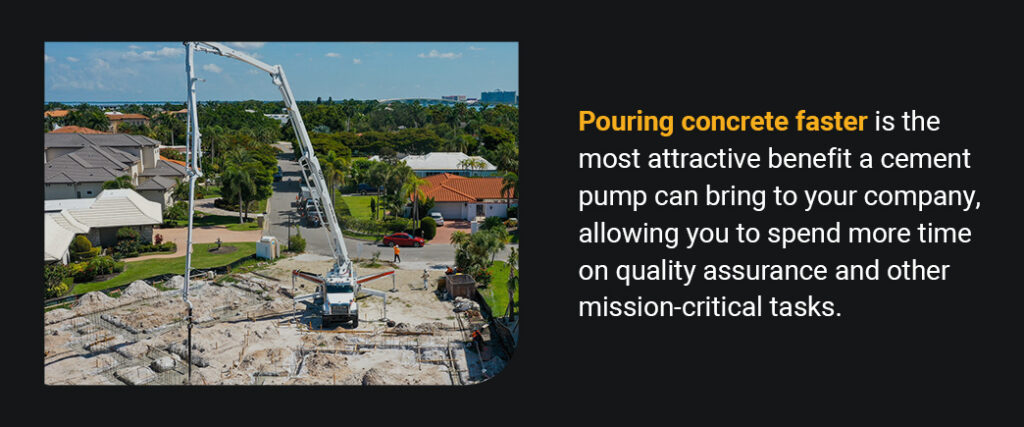
Budget Implications
Weigh the potential returns against the following ongoing costs incurred by your concrete pump.
- Operating costs: Operating costs for a concrete pump include the fuel and employees needed to use it.
- Maintenance: From replacing parts to sending them in for services, keeping your equipment functioning costs money. Sometimes, concrete pump maintenance also requires new parts. If parts are readily available, you can make emergency repairs relatively quickly. If not, you may face delays and additional expenses associated with ordering specialty components.
- Insurance premiums: Insurance is a vital part of owning construction equipment. Liability and equipment insurance premiums are monthly costs you must factor into your budget.
- Storage costs: You must store unused equipment somewhere, and renting this space for your fleet can be expensive. Calculate how much each piece of equipment costs per month for storage. Then, use that amount to determine your concrete pump’s monthly storage costs, which will also affect its PBP and ROI.
- Transportation: Line pumps attach to trucks, making them easy and cost-effective to transport from site to site. Boom pumps are much larger and can be harder to transport, especially when needed for far-flung sites. Factor transportation costs into your related expenses.
- Financing: Many construction companies finance their heavy equipment. These monthly payments and their interest rates are a significant part of the concrete pump’s budget implications.
- Depreciation: The depreciation rate is different for each piece of equipment, depending on how much you use it, its initial cost and the model’s age. Remember this factor if you plan to sell your pump when it’s time for an upgrade.
- Taxes: The tax payments you need to make for different pieces of equipment are essential budgetary implications.
Get Your Concrete Pump From DY Concrete Pumps Today
DY Concrete Pumps is your partner in increasing your efficiency, maximizing your ROI and upgrading your fleet. Find more work, meet project deadlines faster and be an industry leader with our high-quality equipment. Find what you need by browsing our concrete pump catalog today.
To find out more about our products and financing options, you can contact us online or call us at 844-397-8677 and request a custom quote from us at any time.


 1-844-397-8677
1-844-397-8677
